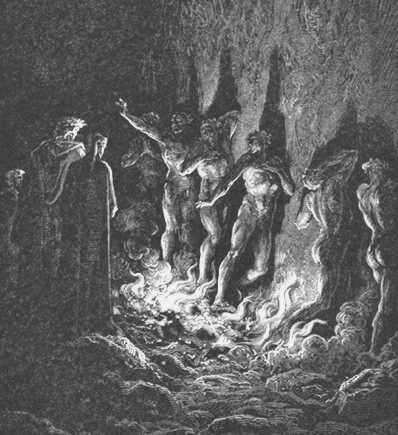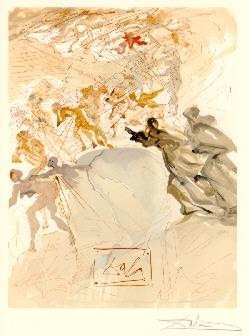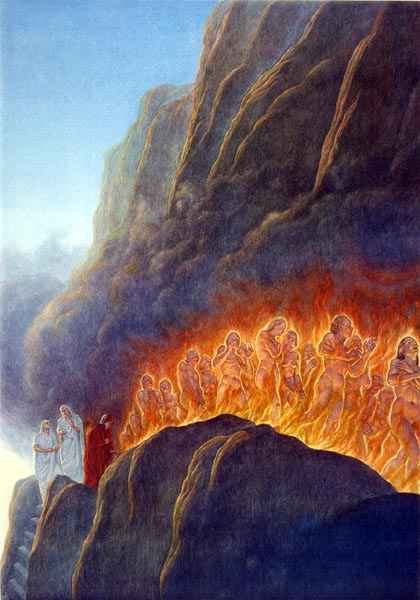 |
 |
 |
|
|
|
|
 |
 |
 |
|
|
|
|
| PURG25 |
|
|
|
|
| ........... | ....... G.GUAITA |
................................. H.W.LONGFELLOW |
...... .D.ALIGHIERI |
....... ... | ....... |
| 1
|
A
muntè
sü,
's
pudìva
nén spitè, che 'l sul a l'àva al meridiàn 'd mezdì lasà al Tor, e la nöt a la Scurpiòn: |
Now
was it the ascent no hindrance brooked, Because the sun had his meridian circle To Taurus left, and night to Scorpio; Wherefore as doth
a man who
tarries not, In this wise did
we enter
through the gap, |
Ora
era
onde
'l
salir non volea storpio; ché 'l sole avea il cerchio di merigge lasciato al Tauro e la notte a lo Scorpio: |
| 4
|
e
tam
mè
l'om
che
'l va e 's fèrma nén e 'l tìra drit sénsa vardèsi 'n gir, parchè lònche l'ha bzogn da fè lü 'l sa, |
per che,
come fa
l'uom che non s'affigge ma vassi a la via sua, che che li appaia, se di bisogno stimolo il trafigge, |
|
| 7
|
cuzì
i
entrùma
nuj
anti
'n pasàgi, iün après l'àut, sü par na scàla strëta che pü che iün lasàva nén pasè. |
così intrammo
noi per la callaia, uno innanzi altro prendendo la scala che per artezza i salitor dispaia. |
|
| 10
|
E
tam
mè
'l
cicugnìn
che 'l völ vulè a l'àusa l'àla, e pö, par la pagüra ad lasè 'l nì, lu zbàsa tùrna giü, |
And
as the little stork that lifts its wing With a desire to fly, and does not venture To leave the nest, and lets it downward droop, Even such was I,
with the
desire of asking Not for our pace,
though
rapid it might be, |
E quale
il cicognin
che leva l'ala per voglia di volare, e non s'attenta d'abbandonar lo nido, e giù la cala; |
| 13
|
a
iàva
mi
na
vòja
vìsca e zmòrsa ad ciamè; e mi i fàva urmàj la mòsa ad chi 's prepàra e già l'è lì par dì. |
tal era
io con voglia
accesa e spenta di dimandar, venendo infino a l'atto che fa colui ch'a dicer s'argomenta. |
|
| 16
|
Andànd
an
prèsa
al
me
maèstru 'm dis: "Fa pàrti donc la frècia da la còrda; la to dumànda urmàj t'è cuncepì". |
Non
lasciò, per l'andar
che fosse ratto, lo dolce padre mio, ma disse: «Scocca l'arco del dir, che 'nfino al ferro hai tratto». |
|
| 19
|
Alùra
'm
tén
pü
nén
e durvénd bùca, mi i cumìnc' :"Ma mè l'è che 'l pöl vnì màgar iün che da bzogn ià nén ad nütrimént?". |
With
confidence I opened then my mouth, And I began: "How can one meagre grow There where the need of nutriment applies not?" "If thou wouldst
call to
mind how Meleager And wouldst thou
think how
at each tremulous motion |
Allor
sicuramente
apri' la bocca e cominciai: «Come si può far magro là dove l'uopo di nodrir non tocca?». |
| 22
|
"Se
't
tén'i
a
mént
mè l'è che 'l Meleàgro, mè 'n toc ad bosc al föc l'è scumparì, - 'l maèstru 'm dis - pü fàcil l'è capì. |
«Se
t'ammentassi
come Meleagro si consumò al consumar d'un stizzo, non fora», disse, «a te questo sì agro; |
|
| 25
|
E
se
't
pénsi
che
l'imàgin antla spèc' ia stèsi mòsi fa 'd cul ch'ià davànti, 'd dificultà, mi i dis, 't n' avrè nén tànti. |
e se
pensassi come,
al vostro guizzo, guizza dentro a lo specchio vostra image, ciò che par duro ti parrebbe vizzo. |
|
| 28
|
Ma
parchè
ti
'l
tüt
t'àbji pü bén spiegà, Stàsiu l'è chi :a lü mi i ciàm e i prég che 'l pòrta i to pensé a verità". |
But
that thou mayst content thee in thy wish Lo Statius here; and him I call and pray He now will be the healer of thy wounds." "If I unfold to
him the eternal
vengeance," Then he began:
"Son, if these
words of mine |
Ma
perché
dentro a tuo voler t'adage, ecco qui Stazio; e io lui chiamo e prego che sia or sanator de le tue piage». |
| 31
|
"Se
a
lü
'l
divìn
mistéri mi i dizvél - rispònd la Stàsiu - e ti t'è chi prezént, sìa disculpà che a ti, dì 'd no i pös nén". |
«Se
la veduta
etterna li dislego», rispuose Stazio, «là dove tu sie, discolpi me non potert'io far nego». |
|
| 34
|
Pö
'l
cumìncia
cuzì:"Se
i
mè paròli, car fiö, an cör ti 't ricévi e 'ntla to mént, saràn lùce che 't fan cesè 'l turmént. |
Poi
cominciò:
«Se le parole mie, figlio, la mente tua guarda e riceve, lume ti fiero al come che tu die. |
|
| 37
|
Al
sang
perfèt
che
l'è
nén stat beivü' mè l'àut da i vén'i, ma da part al rèsta mè lònche 's vànsa, nén tucà, da tàula, |
The
perfect blood, which never is drunk up Into the thirsty veins, and which remaineth Like food that from the table thou removest, Takes in the
heart for all
the human members Again digest,
descends it
where 'tis better |
Sangue
perfetto, che
poi non si beve da l'assetate vene, e si rimane quasi alimento che di mensa leve, |
| 40
|
'l
pìa
'ntal
cör,
par
fè ògni part dal corp, virtü' 'infurmatìva' ; méntre l'àut 'nti vén'i 'l va a nütrì la nòsa carn. |
prende
nel core a
tutte membra umane virtute informativa, come quello ch'a farsi quelle per le vene vane. |
|
| 43
|
Ancù
sincér,
al
rìva
'ndùa
l'è bèl stè cìtu pü che dì; da chi la stìsa sü n àutar sang 'nti 'n natüral vazèl. |
Ancor
digesto, scende
ov'è più bello tacer che dire; e quindi poscia geme sovr'altrui sangue in natural vasello. |
|
| 46
|
Chi
iün
e
l'àut
ansèma
lur 's cumbìn'u, iün, dispòst a patì, e l'àut a fè parchè i vén la virtü' da 'n post perfèt, |
There
one together with the other mingles, One to be passive meant, the other active By reason of the perfect place it springs from; And being
conjoined, begins
to operate, The active
virtue, being
made a soul |
Ivi
s'accoglie l'uno
e l'altro insieme, l'un disposto a patire, e l'altro a fare per lo perfetto loco onde si preme; |
| 49
|
e
mis'cià
cun
cul,
'l
cumìncia a travajè, prìma quagiànd e pö 'nche dand la vìta a la matéria ca l'è fat quagè. |
e, giunto
lui, comincia
ad operare coagulando prima, e poi avviva ciò che per sua matera fé constare. |
|
| 52
|
Pöj
la
virtü'
atìva
ànima
's fa mè ànche 'd na piànta l'è; cun diferénsa, che iün a l'è rivà, l'àut a l'è 'n vìa; |
Anima
fatta la virtute
attiva qual d'una pianta, in tanto differente, che questa è in via e quella è già a riva, |
|
| 55
|
Pö
tant
la
fa
che
già la bùgia e sént, mè fa ànche 'n fons ad mar; e pö l'amprénd urganizè i 'puténsi' , lé, la sméns. |
Then
works so much, that now it moves and feels Like a sea-fungus, and then undertakes To organize the powers whose seed it is. Now, Son, dilates
and now
distends itself But how from
animal it man
becomes |
tanto
ovra poi, che
già si move e sente, come spungo marino; e indi imprende ad organar le posse ond'è semente. |
| 58
|
Adès,
car
fiö,
sa
spiéga
e 's disténd bén la virtü' che vén dal cör dal genitùr, che tüti i part dal corp a furmè ténd. |
Or si
spiega, figliuolo,
or si distende la virtù ch'è dal cor del generante, dove natura a tutte membra intende. |
|
| 61
|
Ma
d'animàl
mè
'l
fàza
vnì bambìn, ancùra 't vëdi nén ; pròpi cust l'è che iün pü brav che ti l'ha fat zbagliè, |
Ma come
d'animal
divegna fante, non vedi tu ancor: quest'è tal punto, che più savio di te fé già errante, |
|
| 64
|
cul
che
'ntal
so
pensé
l'ha separà da l'ànima al 'pusìbil intelèt' parchè na séde lü 'l truvàva nén. |
So
far, that in his doctrine separate He made the soul from possible intellect, For he no organ saw by this assumed. Open thy breast
unto the
truth that's coming, The primal Motor
turns to
it well pleased |
sì che
per sua dottrina
fé disgiunto da l'anima il possibile intelletto, perché da lui non vide organo assunto. |
| 67
|
Dès
dörv
a
verità
e
cör e mént: sàpia che 'ntal féto, quànd al sarvèl a funsiunè l'è pront e già perfèt, |
Apri a la
verità
che viene il petto; e sappi che, sì tosto come al feto l'articular del cerebro è perfetto, |
|
| 70
|
'al
prim
mutùr'
,
al
vén a lü cuntént dla grand àrte 'd natüra , e andrén j inspìra na spìrit növ che l'è 'd virtü' tüt pién; |
lo motor
primo a
lui si volge lieto sovra tant'arte di natura, e spira spirito novo, di vertù repleto, |
|
| 73
|
lü
lònche
lì
al
tròva
atìv l'asòrb an so sustànsa e i vén n'ànima sùla, che viv e sént e dzùra ad lé 's rigìra. |
Which
what it finds there active doth attract Into its substance, and becomes one soul, Which lives, and feels, and on itself revolves. And that thou
less may wonder
at my word, Whenever Lachesis
has no
more thread, |
che
ciò che
trova attivo quivi, tira in sua sustanzia, e fassi un'alma sola, che vive e sente e sé in sé rigira. |
| 76
|
Parchè
ti
t'àbji
nén
'd
rastè stüpì, vàrda 'l calùr dal sul che pö 's fa vin, a la sàiva giuntà che vén dla vì. |
E perché
meno ammiri
la parola, guarda il calor del sole che si fa vino, giunto a l'omor che de la vite cola. |
|
| 79
|
E
quànd
che
Lachezìs
ià
pü nén lin, as lìbera dla carn e 'n virtü' pòrta ansèma a lé l'ümàn cun al divìn: |
Quando
Lachesìs
non ha più del lino, solvesi da la carne, e in virtute ne porta seco e l'umano e 'l divino: |
|
| 82
|
I
àuti
'puténsi'
tüti
quànti
müti; memòria, inteligénsa e vuluntà 'in atto' pü che prìma tant avüsi. |
The
other faculties are voiceless all; The memory, the intelligence, and the will In action far more vigorous than before. Without a pause
it falleth
of itself Soon as the place
there circumscribeth
it, |
l'altre
potenze tutte
quante mute; memoria, intelligenza e volontade in atto molto più che prima agute. |
| 85
|
Sénsa
farmèsi
dasparlé
la
càsca, par miràcul a iün'a di dùi rìvi; chi lé, cunòs quàla sìa la so strà. |
Sanza
restarsi per
sé stessa cade mirabilmente a l'una de le rive; quivi conosce prima le sue strade. |
|
| 88
|
Pén'a
che
l'ària
antùrn,
a
lu circònda, la virtü' 'infurmatìva' sémp travàja mè prìma l'àva fat a fè 'l corp viv. |
Tosto che
loco lì
la circunscrive, la virtù formativa raggia intorno così e quanto ne le membra vive. |
|
| 91
|
E
tam
mè
l'ària,
quànd
l'è pién'a 'd
piöva, par vìa di rag' dal sul che 'n lé 's riflètu, la fùrma l'arcansièl dai bèj culùr; |
And
even as the air, when full of rain, By alien rays that are therein reflected, With divers colours shows itself adorned, So there the
neighbouring
air doth shape itself And then in
manner of the
little flame, |
E come
l'aere, quand'è
ben piorno, per l'altrui raggio che 'n sé si reflette, di diversi color diventa addorno; |
| 94
|
cuzì
la pìa l'ària vzin la fùrma che i dà tam mè 'n sigìl virtüalmént, l'ànima dop che l'è rivà 'nsal post; |
così l'aere
vicin quivi si mette in quella forma ch'è in lui suggella virtualmente l'alma che ristette; |
|
| 97
|
e
pròpi
mè
la
fa
ànche la fiàma che sémp andùa la va sta 'nsèma 'l föc, l'istès la spìrit fa 'ntla fùrma növa. |
e
simigliante poi
a la fiammella che segue il foco là 'vunque si muta, segue lo spirto sua forma novella. |
|
| 100
|
E
ricevénd
da
cùsta
la
parvénsa, lé, òmbra l'è ciamà; pö custrüìs cun tüti i àuti séns, fìn'a la vìsta. |
Since
afterwards it takes from this its semblance, It is called shade; and thence it organizes Thereafter every sense, even to the sight. Thence is it that
we speak,
and thence we laugh; According as
impress us our
desires |
Però che quindi
ha poscia sua paruta, è chiamata ombra; e quindi organa poi ciascun sentire infino a la veduta. |
| 103
|
Cuzì
l'è
che
nuj
parlùma
e i ridùma, furmùma cùli làcrimi e i suspìr che chi, 'nsal mont, antùrn ti t'è santì. |
Quindi
parliamo e
quindi ridiam noi; quindi facciam le lagrime e ' sospiri che per lo monte aver sentiti puoi. |
|
| 106
|
Cunfùrm
ai
dezidéri
e
i
sentimént ca pròva, l'òmbra uguàl figüra pìa; e cust a l'è che 't fàva maravìa". |
Secondo
che ci affiggono
i disiri e li altri affetti, l'ombra si figura; e quest'è la cagion di che tu miri». |
|
| 109
|
Già
iéru
nuj
rivà,
zvultànd
a drìta, a cul ca l'éra urmàj l'ültim giròn ; e chi iè d'àut che 'n tìra l'atensiòn. |
And
now unto the last of all the circles Had we arrived, and to the right hand turned, And were attentive to another care. There the
embankment shoots
forth flames of fire, Hence we must
needs go on
the open side, |
E
già venuto
a l'ultima tortura s'era per noi, e vòlto a la man destra, ed eravamo attenti ad altra cura. |
| 112
|
Dès,
la
paréj
,
la
büta fòra i fiàmi, e da l'ùrlu vén sü anvéce an vént che iu fa stòrzi an àut, paràndji vìa; |
Quivi la ripa
fiamma in
fuor balestra, e la cornice spira fiato in suso che la reflette e via da lei sequestra; |
|
| 115
|
Düvìvu
stè
an
brùa
al
precipìsi, iün darè l'àut e mi, da là, pagüra iàva dal föc, da chi, ad caschè giü. |
ond'ir ne
convenia
dal lato schiuso ad uno ad uno; e io temea 'l foco quinci, e quindi temeva cader giuso. |
|
| 118
|
E
'l
düca:"Abzògna
tén'i
a
post la mént e nén parmëtsi 'd piè nànca na zvìsta, parchè bastrìa la zbàgliu di 'n mumént": |
My
Leader said: "Along this place oneought To keep upon the eyes a tightened rein, Seeing that one so easily might err." "Summae Deus
clementiae,"
in the bosom And spirits saw I
walking
through the flame; |
Lo duca
mio dicea:
«Per questo loco si vuol tenere a li occhi stretto il freno, però ch'errar potrebbesi per poco». |
| 121
|
"'Summae
deus
clementiae'
da
là,
'ndrénta al gran calùr, santìva cantè bén tant che 'd vardè 'nche là, mi iàva vòja; |
'Summae
Deus
clementiae'
nel seno al grande ardore allora udi' cantando, che di volger mi fé caler non meno; |
|
| 124
|
spìrit
ia
vdìva
an
mès
i fiàmi andè, e 'n poc vardàva lur e 'n poc ai pé, ausànd, zbasànd la vìsta ad ògni pas. |
e vidi
spirti per
la fiamma andando; per ch'io guardava a loro e a' miei passi compartendo la vista a quando a quando. |
|
| 127
|
Quànd
che
'd
cul
ìnno
ién rivà a la fin, fort i criàvu:' Virum non cognosco'; pö 'ncùra a bàsa vus, ia 'rpiàvu l'ìnno. |
After
the close which to that hymn is made, Aloud they shouted, "Virum non cognosco;" Then recommenced the hymn with voices low. This also ended,
cried they:
"To the wood Then to their
song returned
they; then the wives |
Appresso
il
fine
ch'a
quell'inno fassi, gridavano alto: 'Virum non cognosco'; indi ricominciavan l'inno bassi. |
| 130
|
Finì
'd
cantè,
as
bütu
ancù a criè: "Dal bosc Diàna Elìs l'ha parà vìa parchè 'd Vénere l'àva sagià 'l velén". |
Finitolo,
anco gridavano:
«Al bosco si tenne Diana, ed Elice caccionne che di Venere avea sentito il tòsco». |
|
| 133
|
Pö
'ncu
i
cantàvu;
e
dop criàvu i nom d'òmni e 'd dòni santi par la virtü' ca völ an matrimoni che 'l sia giüst. |
Indi al
cantar tornavano;
indi donne gridavano e mariti che fuor casti come virtute e matrimonio imponne. |
|
| 136 | E
sa
manéra
i
crëd
che maj finìsa par tüt al témp che là 'n cul föc i brüzu: l'è cùsta chi la cüra, cùsta la diéta |
And
I believe that them this mode suffices, For all the time the fire is burning them; With such care is it needful, and such food, That the last wound of all should be closed up. |
E
questo modo
credo che lor basti per tutto il tempo che 'l foco li abbruscia: con tal cura conviene e con tai pasti |
| 139 | fin che la piàga dal pecà guarìsa. | che la piaga da sezzo si ricuscia. |